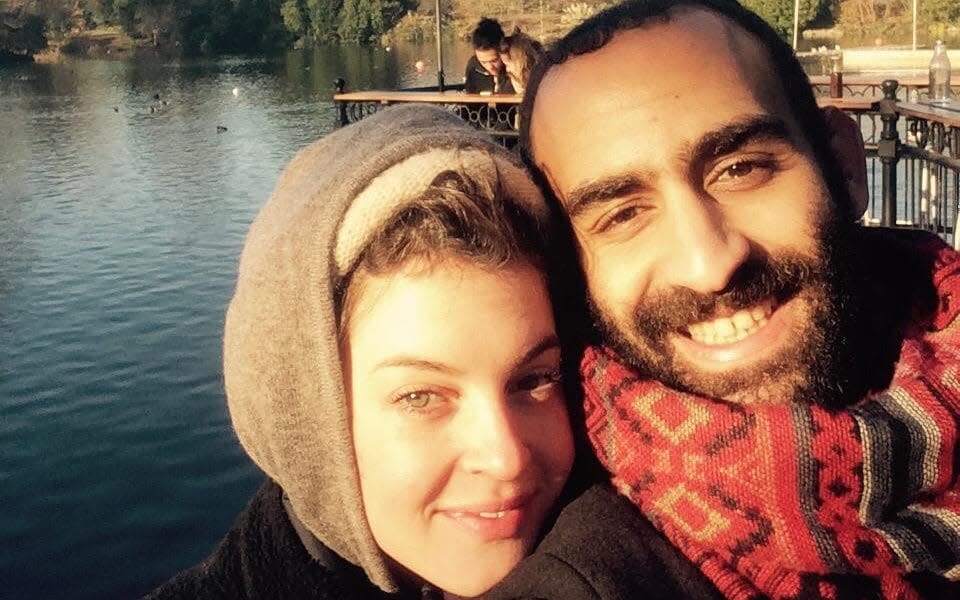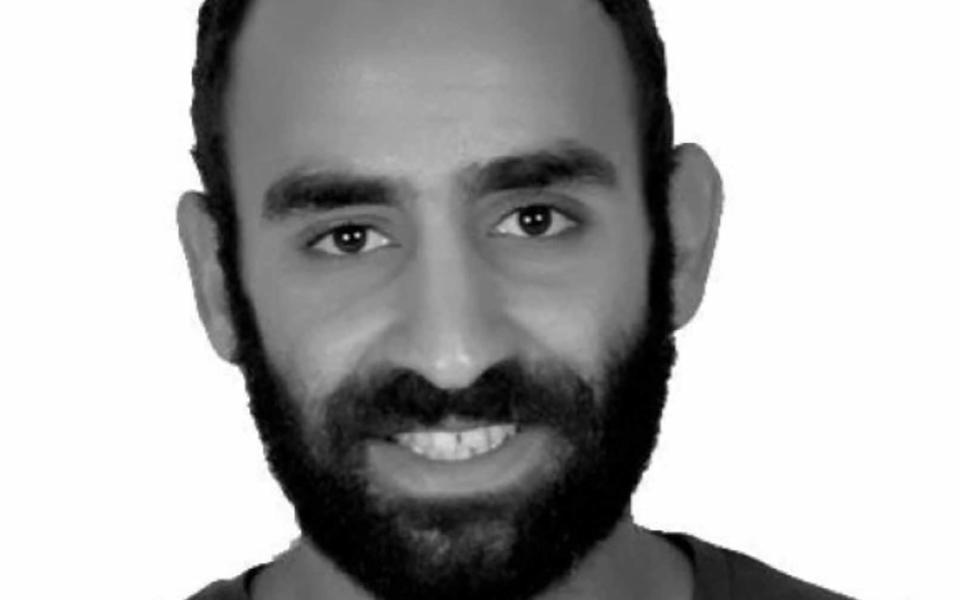Detained Egyptian rights advocate was planning move to UK, his British wife says

An Egyptian human rights advocate detained on “terrorism” charges in Cairo last week was planning to move to the UK due to the deteriorating political situation in the country, his British wife has told The Telegraph.
Karim Ennarah, who works for the Egyptian Initiative for Personal Rights (EIPR), was arrested last last week while on holiday in the Sinai resort town of Dahab, days before his wife Jessica Kelly was due to fly out from London to join him.
“He easily could have come to Europe before,” Ms Kelly said of her husband, who completed a masters degree at the School of Oriental and African Studies in London in 2016. “He stuck for so many years doing this job that was incredibly dangerous, that took a huge toll on his life and his mental health.”
Mr Ennarah was detained as he returned from a swim in the Red Sea on Wednesday but had been expecting arrest since his colleague Mohammed Bashir was arrested on Sunday and his Cairo home raided on Monday. The group’s executive director, Gasser Abdel-Razek, was detained the day after Mr Ennarah’s arrest.
The arrests are the latest escalation of a crackdown in Egypt that has been ongoing since former army chief Abdel Fattah el-Sisi took power in a 2013 military coup that ousted the country’s first democratically elected president Mohammed Morsi. Last year, Human Rights Watch estimated there are 60,000 political prisoners in the country.
Mr Ennarah, 37, had documented the country’s fraught relationship with fundamental rights for EIPR since the giddy days of the uprising to overthrow longtime leader Hosni Mubarak in 2011. As the country gradually suppressed all form of dissent, Mr Ennarah’s work shifted from documenting the state’s excessive use of force at protests to researching illegal arrests and capital punishment.

EIPR attempted to work openly with the government but Mr Ennarah had previously been called in for questioning by security forces. Despite knowing he could be jailed, he was reluctant to leave Egypt, Ms Kelly said.
“He felt like if he’s not there, then who’s going to be there? If everybody leaves, it’s opening the door to the regime’s oppression,” she said. “He’s a patriotic person, he loves Egypt, he believes that the Egyptian people deserve a lot better.”
After maintaining a long distance relationship for years, the couple finally agreed that Mr Ennarah should move to London, Ms Kelly said. The couple married at the justice ministry in Cairo in September, saving a major celebration until after the pandemic.
“I wanted to support him in the amazing work that he’s doing but at the same time I knew how dangerous it was and it was only a matter of time before this sort of thing would happen,” said Ms Kelly, a filmmaker who has worked across the Middle East.
EIPR says the immediate trigger for the arrest of its staff was a meeting the group held on November 3 to discuss Egypt’s rights record with European ambassadors and diplomats.

“Seeing this meeting between EIPR and 13 different countries could be taken as a real insult, as though EIPR is an alternative government almost,” Ms Kelly said of how authorities may have interpreted the forum. “People really don’t appreciate how hostile it is in Egypt for anyone working in journalism or human rights or for anyone who has a different opinion to the regime.”
Mr Ennarah and his colleagues are now being held on remand alongside other political prisoners in Cairo’s notorious Torah prison. They can legally be held in pre-trial detention for up to two years, though some prisoners have been held for longer without conviction. “This is a state security case where no documents or evidence are ever given and there’s no trial,” said Ms Kelly. “You can think of it more as kidnap by the state.”
On Monday, EIPR director Mr Abdel-Razek was able to speak to lawyers for the first time since his arrest at his first court appearance. He told them he was being held in solitary confinement in a cell without a mattress or warm clothes, EIPR said.
"We saw Gasser just now taken out of the prosecution office in a police transport van. The only thing he shouted from the narrow, barred van window was, 'Mariam! Say hello to the boys. I love you!'" EIPR wrote in a statement. His wife was reportedly not allowed to speak with him.

A lobbying campaign is now underway, with expressions of concern coming from US lawmakers, the UN Human Rights Office and the European Union Delegation to Egypt.
“The incoming administration [of US president-elect Joe Biden] must make it clear to Egypt and all countries that, once again, the United States will support democracy, not dictatorship,” said US Senator Bernie Sanders.
“No one should be arrested for having a political opinion," said UN Secretary General António Guterres.
Foreign Secretary Dominic Raab has raised the men’s detention with his Egyptian counterpart. “We have been in regular contact with the Egyptian authorities since the arrests took place,” a Foreign Office spokesperson said Sunday. “We are working closely with partners in the international community who share our concerns.”
Egyptian foreign ministry spokesman Ahmed Hafez said he “rejects any attempt to influence the investigation of the prosecution's investigation into Egyptian citizens who have been indicted.”
Previous high profile political prisoners have been freed following international pressure, including Al Jazeera journalists Mohamed Fahmy, Baher Mohamed, and Peter Greste who were arrested in December 2013 and jailed for over a year.
“The regime got completely sick of hearing about these guys at the start of every meeting with Europe and the US officials,” Ms Kelly said. “We need to be as dogged and relentless in our position that these arrests are unacceptable.”
But Mr Ennarah, who understands the Egyptian judiciary better than most, may yet remain guarded about his odds of obtaining a fair hearing.
“The justice system is on the verge of complete dysfunctionality," he said in 2016, when interviewed about a toddler sentenced to life in prison in a mistaken identity case.

